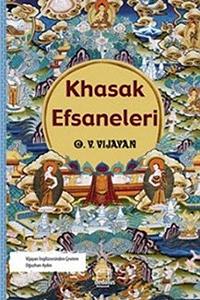Take a photo of a barcode or cover
It's a pity that Khasakkinte Ithihasam was introduced to me as "what One Hundred Years of Solitude's Macondo was to Aracataca is what Khasakkinte Ithihasam's Khasak was to Thasarak." I mean, I get it. My head hurt just as much reading this as it did when I was reading One Hundred Years of Solitude, and I by no means understood nearly enough of book, but I still think I got a lot more of the implied subtext because, unlike Macondo, Khasak is nammude swantham (well, kinda).
Throughout the time I was reading (or after the prose got too hard and I switched to the audiobook), I was going around randomly saying Allappicha Mollakka, much like I would randomly sprout out José Arcadio Buendía. And I get it, okay—I know I am referencing One Hundred Years of Solitude a lot for someone who opened this review the way I did.
I don't think I've ever read anything else that portrayed guilt better. Though not my favorite, I liked the portrayal of betrayal (I think? Because it do be abstract, nah mean).
And hi, I know you're reading this and you don't read malayalam—the english translation (though there are some differences) was written by the original author O. V. Vijayan, and if you want a peek into a magical-realism-esque take on Kerala, add it to your to-read list. (And if you think you do read malayalam and are stubborn like I was, when the palakkadan-tamil-malayalam prose inevitably gets impossible, the free audiobooks on youtube are awesome—the book is head-hurting enough without having to decode the words) thank you alisha
...is this...the longest review I've written? allappicha mollakka byeeee
He a fellow reader who got drunk on good literature; the typical think tank character, who went on to live a prolific political career in college.
But me at the time; the snob that i was got kicks out of authors that were more or less Anglican. Even today, it took considerable self persuasion to get lost in this novel. i struggled at first, the language of my ancestors, seeming almost ancient for one who had lost use to them.
But then i was assaulted. with remembrance. of the lush, engaging and complex heritage that i hail from. where the stalwarts of literature and art had dared to tackle issues considered uncomfortable even in today's open era.
There is a term that is often thrown around in association with realistic depictions of people. "പച്ചയായ മനുഷ്യരുടെ കഥ" I fathom whether it bears birth from this seminal work in literature.
The novel bookends at the same place it began. at a modest, sometimes decrepit bus Stand to a almost Phantasmic village, kept leagues removed from the world as we know, or knew.
It were as if, Vijayan master took all the various shades of humanity he came across, during his prolific life, and made a home for them. where they loved and lived and died, and became the sprites; much like the legend Sheikh Thangal.
We are reminded of the time that was once a reality. It was indeed to those of us still graced by the blanketing grace of our elders. As a literary time capsule, the metaphorical city of Kandor. unchanging; eternal.
it is often said, that a writer is most uninhibited when he writes a story for one reader. That is quite apt here. We are aquainted with characters who do not feel belong in a page. they are people, living breathing, and human.
They are not perfect, by any stretch of the word. Some actions they take seem to have no rational thought behind them. Yet for the same reason they are, so Human.
Same can be said to our Protagonist, Ravi. And Individual who by no stretch of the word embodies the unsaid qualities as required by a leading man; often times his words and action made me uncomfortable.
Which is only natural, as more times than none, the protagonist is the vessel which the reader embodies. To be reminded of his shortcomings and failings, makes us look inside and ponder.
Ravi is a wanderer. Some may call him a coward, running away from suffering and perhaps the reality of his father's mortality. He is a voyeur who indulges in several vices, perhaps to detach himself from the thoughts. Those that whisper to him, from the depths of the swamp, the canopies of the old tree, in form of the goddess in the temple; In The call to prayer Athan and Iqamah.
Ravi is running. from one thing or another. Yet for every step he takes the distance only seems to shorten by four.
His sexual promiscuity and other habits, make me worry for the children that he is to serve as a role model to. Then again perhaps this is just the Mirror of my mind, speaking the truth. But that is the point, a Work of literature that makes me question my place and existence. the way in which life is, and was; it is truly something magnificent.
I would recommend, to those who can, to read the original work in Malayalam. The translations I found quite lacking; Having lost the bite and depth of the native tongue. Either way a story worth Knowing.
He a fellow reader who got drunk on good literature; the typical think tank character, who went on to live a prolific political career in college.
But me at the time; the snob that i was got kicks out of authors that were more or less Anglican. Even today, it took considerable self persuasion to get lost in this novel. i struggled at first, the language of my ancestors, seeming almost ancient for one who had lost use to them.
But then i was assaulted. with remembrance. of the lush, engaging and complex heritage that i hail from. where the stalwarts of literature and art had dared to tackle issues considered uncomfortable even in today's open era.
There is a term that is often thrown around in association with realistic depictions of people. "പച്ചയായ മനുഷ്യരുടെ കഥ" I fathom whether it bears birth from this seminal work in literature.
The novel bookends at the same place it began. at a modest, sometimes decrepit bus Stand to a almost Phantasmic village, kept leagues removed from the world as we know, or knew.
It were as if, Vijayan master took all the various shades of humanity he came across, during his prolific life, and made a home for them. where they loved and lived and died, and became the sprites; much like the legend Sheikh Thangal.
We are reminded of the time that was once a reality. It was indeed to those of us still graced by the blanketing grace of our elders. As a literary time capsule, the metaphorical city of Kandor. unchanging; eternal.
it is often said, that a writer is most uninhibited when he writes a story for one reader. That is quite apt here. We are aquainted with characters who do not feel belong in a page. they are people, living breathing, and human.
They are not perfect, by any stretch of the word. Some actions they take seem to have no rational thought behind them. Yet for the same reason they are, so Human.
Same can be said to our Protagonist, Ravi. And Individual who by no stretch of the word embodies the unsaid qualities as required by a leading man; often times his words and action made me uncomfortable.
Which is only natural, as more times than none, the protagonist is the vessel which the reader embodies. To be reminded of his shortcomings and failings, makes us look inside and ponder.
Ravi is a wanderer. Some may call him a coward, running away from suffering and perhaps the reality of his father's mortality. He is a voyeur who indulges in several vices, perhaps to detach himself from the thoughts. Those that whisper to him, from the depths of the swamp, the canopies of the old tree, in form of the goddess in the temple; In The call to prayer Athan and Iqamah.
Ravi is running. from one thing or another. Yet for every step he takes the distance only seems to shorten by four.
His sexual promiscuity and other habits, make me worry for the children that he is to serve as a role model to. Then again perhaps this is just the Mirror of my mind, speaking the truth. But that is the point, a Work of literature that makes me question my place and existence. the way in which life is, and was; it is truly something magnificent.
I would recommend, to those who can, to read the original work in Malayalam. The translations I found quite lacking; Having lost the bite and depth of the native tongue. Either way a story worth Knowing.





